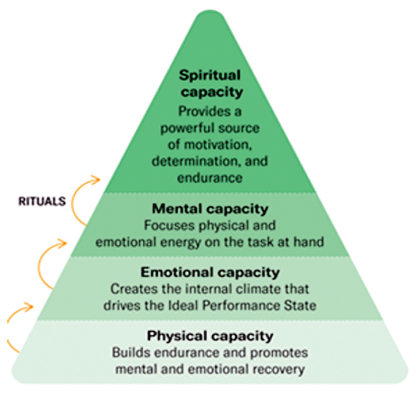It’s 6 a.m. Nimal went to the walking path for a morning walk. He tried to walk, but he was struggling. He couldn’t even complete five rounds. He thought something must be wrong. Immediately, he came home, did some medical tests, and found that he had developed several common non-communicable diseases—high blood pressure, diabetes, and high cholesterol.
What went wrong? Has he failed in life? That was the first question that came to his mind.
Yes, in a way, he had failed as a professional despite having many titles, a big name, and a high position. Why did he fail?
The above is an illustrative scenario that many people experience in their lives. It made me think: What is the best approach to life?
Then, by chance, I came across an article titled “The Making of a Corporate Athlete” in the Harvard Business Review. The article discussed how to achieve peak performance in the corporate world.
Just like an athlete, a corporate professional must focus on four key areas to succeed. The article emphasised that stressful situations drain our energy, and to maintain high performance, we need to recover that energy.
- Physical Capacity (foundation)
- Emotional Capacity
- Mental Capacity
- Spiritual Capacity (top)
As per the article, The Ideal Performance State (IPS) (Peak performance) can be achieved with full engagement across all four levels and all levels are interconnected. It clearly says Peak performance isn’t just about intellect. We think about only intellect to achieve success. It is completely wrong.
Until for some time, intellect can provide you with the required competitive advantage. However, if you do not balance the above mentioned four perspectives, then you will not be able to perform well. We will look at all four perspectives.
Physical capacity
Energy is our capacity to do work. Physical Capacity is the foundation of energy and endurance. To build physical capacity, certain rituals are necessary. These include regular workouts, proper sleep, staying hydrated, and eating nutritious food.
i. Workouts – Engaging in physical exercise increases energy levels and endurance. Weight lifting is considered one of the most effective methods. It is recommended to do at least two weight-training workouts a week to build strength and energy. Alternatively, exercises like walking, cycling, or other cardio activities can also be beneficial.
ii. Sleep – Getting enough quality sleep is essential for energy renewal. Ideally, you should sleep for seven to eight hours each night. Uninterrupted and consistent sleep helps the body recover and boosts physical performance.
iii. Nutrition – A balanced and healthy diet fuels the body for work and recovery. A recommended dietary ratio includes 50 percent to 60 percent complex carbohydrates, 25 percent to 35 percent protein, and 20 percent to 25 percent fat. Avoiding excessive sugar and eating smaller, more frequent meals supports steady energy levels throughout the day.
iv. Hydration – Drinking enough water is critical for maintaining energy and preventing fatigue. It’s suggested to drink four to five 12-ounce glasses of water daily, even if you don’t feel thirsty. Hydration helps with concentration and physical performance.
Emotional capacity
The next level of high performance is your emotional state. Top athletes say they perform best when they feel calm, focused, happy, and confident. Negative emotions like anger, fear, or frustration—drain energy and hurt performance.
 Whether you’re an athlete, a surgeon, or an executive, the best performance comes when you’re in a positive emotional state. Athletes who feel anxious or scared are much more likely to fail under pressure. Similarly, anger and frustration make it hard for them to stay calm and focused. Following are strategies to improve emotional capacity.
Whether you’re an athlete, a surgeon, or an executive, the best performance comes when you’re in a positive emotional state. Athletes who feel anxious or scared are much more likely to fail under pressure. Similarly, anger and frustration make it hard for them to stay calm and focused. Following are strategies to improve emotional capacity.
Deep Breathing – Taking slow, deep breaths helps calm the body’s stress response and creates space to respond thoughtfully instead of reacting emotionally.
Empathy – Imagining how others feel during tense moments encourages compassion and helps shift from anger to understanding.
Music – Listening to music can relax the mind, reduce stress, and boost positive energy by shifting brain activity and mood.
Body language – Adopting confident, calm body language, even when stressed can influence how you actually feel and behave.
Close relationships – Spending quality time with loved ones provides emotional safety and recovery, which strengthens your ability to perform under pressure.
Mental capacity
Cognitive Capacity is the third level of the performance pyramid and focuses on thinking clearly, managing time, and maintaining focus. To improve cognitive capacity, the following strategies can be used:
i. Meditation – Practising deep breathing and simple meditation helps calm the mind and improve focus and recovery.
ii. Time Management – Taking regular breaks every 90 to 120 minutes aligns with the body’s natural rhythm and boosts energy and productivity.
iii. Mental recovery rituals – Stepping away from work, like a short walk or quiet time, can refresh the mind and improve performance.
iv. Work-life boundaries – Setting limits on work discussions at home (for example no business talk after 8 pm or on weekends) improves mental clarity and focus.
v. Visualisation – Mentally picturing successful outcomes before key tasks or events boosts confidence, reduces stress, and improves actual performance.
Spiritual capacity
Spiritual capacity is the top level of the performance pyramid. It refers to the energy we draw from having a strong sense of purpose and staying true to our deepest values. This capacity provides motivation, focus, and resilience, especially in tough times.
The following strategies can help build and strengthen spiritual capacity:
i. Connecting to purpose – Aligning daily actions with a deeper purpose—such as protecting loved ones or contributing to something meaningful—creates lasting motivation and helps sustain positive behaviour.
ii. Values-based adaptation – Making choices that reflect your core values, rather than short-term comfort or convenience, supports long-term growth and performance.
iii. Reflection time – Taking regular breaks from busy routines to reflect on life, goals, and personal direction helps restore perspective and reconnects you to what truly matters.
iv. Personal rituals – Engaging in practices like meditation, journal writing, prayer, or acts of service helps recharge energy, break the cycle of constant pressure, and bring clarity and inner peace.
Holistic approach needed
Peak performance in today’s demanding world is not driven by intellect alone. It requires a balanced and holistic approach that includes managing stress through recovery, building consistent rituals, and staying grounded in purpose. When leaders strengthen themselves physically, mentally, emotionally, and spiritually, they not only perform better and longer but also inspire healthier, more resilient organisations. Strong people build strong companies.
– The writer is a senior Chartered Accountant with over 20 years of experience, primarily in the banking sector. He specialises in Strategic Management and Internal Auditing. He is a visiting lecturer at PIM, CA Business School, and IBSL.




